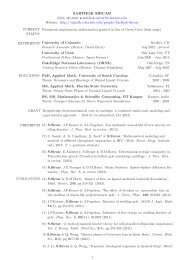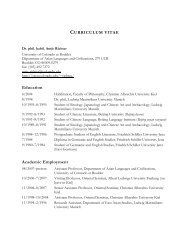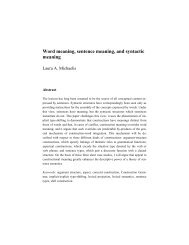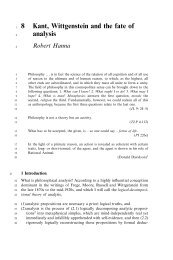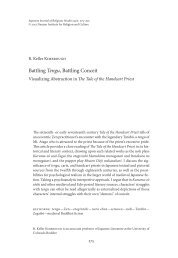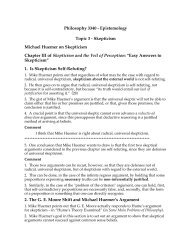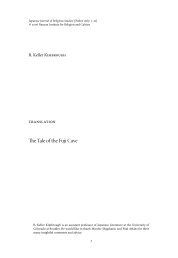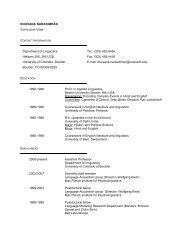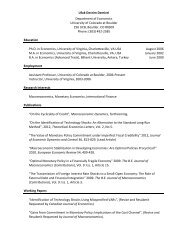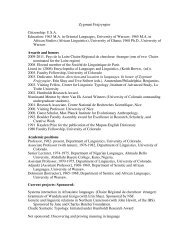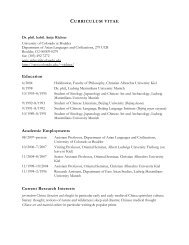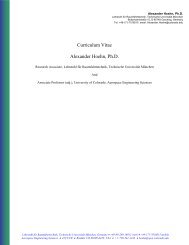Vatican Declaration on Sexual Ethics - spot
Vatican Declaration on Sexual Ethics - spot
Vatican Declaration on Sexual Ethics - spot
Create successful ePaper yourself
Turn your PDF publications into a flip-book with our unique Google optimized e-Paper software.
Michael Tooley's Philosophy Home Page<br />
http://<strong>spot</strong>.colorado.edu/~tooley/<str<strong>on</strong>g>Vatican</str<strong>on</strong>g><str<strong>on</strong>g>Declarati<strong>on</strong></str<strong>on</strong>g>.html<br />
THE VATICAN DECLARATION ON SEXUAL ETHICS<br />
INTRODUCTION<br />
The Importance of <strong>Sexual</strong>ity<br />
I. According to c<strong>on</strong>temporary scientific research, the human pers<strong>on</strong> is so<br />
profoundly affected by sexuality that it must be c<strong>on</strong>sidered as <strong>on</strong>e of the<br />
factors which give to each individual's life the principal traits that<br />
distinguish it. In fact it is from sex that the human pers<strong>on</strong> receives the<br />
characteristics which, <strong>on</strong> the biological, psychological and spiritual<br />
levels, make that pers<strong>on</strong> a man or a woman, and thereby largely c<strong>on</strong>diti<strong>on</strong><br />
his or her progress towards maturity and inserti<strong>on</strong> into society. Hence<br />
sexual matters, as is obvious to every<strong>on</strong>e, today c<strong>on</strong>stitute a theme<br />
frequently and openly dealt with in books, reviews, magazines and other<br />
means of social communicati<strong>on</strong> .<br />
In the present period, the corrupti<strong>on</strong> of morals has increased, and <strong>on</strong>e of<br />
the most serious indicati<strong>on</strong>s of this corrupti<strong>on</strong> is the unbridled<br />
exaltati<strong>on</strong> of sex. Moreover, through the means of social communicati<strong>on</strong> and<br />
through public entertainment this corrupti<strong>on</strong> has reached the point of<br />
invading the field of educati<strong>on</strong> and of infecting the general mentality.<br />
In this c<strong>on</strong>text certain educators, teachers and moralists have been able<br />
to c<strong>on</strong>tribute to a better understanding and integrati<strong>on</strong> into life of the<br />
values proper to each of the sexes; <strong>on</strong> the other hand there are those who<br />
have put forward c<strong>on</strong>cepts and modes of behavior which are c<strong>on</strong>trary to the<br />
true moral exigencies of the human pers<strong>on</strong>. Some members of the latter<br />
group have even g<strong>on</strong>e so far as to favor a licentious hed<strong>on</strong>ism.<br />
As a result, in the course of a few years, teachings, moral criteria and<br />
modes of living hitherto faithfully preserved have been very much<br />
unsettled, even am<strong>on</strong>g Christians. There are many people today who, being<br />
c<strong>on</strong>fr<strong>on</strong>ted with widespread opini<strong>on</strong>s opposed to the teaching which they<br />
received from the Church, have come to w<strong>on</strong>der what must still hold as<br />
true.<br />
The Occasi<strong>on</strong> of this <str<strong>on</strong>g>Declarati<strong>on</strong></str<strong>on</strong>g><br />
1 of 17 10/25/10 10:36 AM
Michael Tooley's Philosophy Home Page<br />
http://<strong>spot</strong>.colorado.edu/~tooley/<str<strong>on</strong>g>Vatican</str<strong>on</strong>g><str<strong>on</strong>g>Declarati<strong>on</strong></str<strong>on</strong>g>.html<br />
II. The Church cannot remain indifferent to this c<strong>on</strong>fusi<strong>on</strong> of minds and<br />
relaxati<strong>on</strong> of morals. It is a questi<strong>on</strong>, in fact, of a matter which is of<br />
the utmost importance both for the pers<strong>on</strong>al lives of Christians and for<br />
the social life of our time.[1]<br />
The Bishops are daily led to note the growing difficulties experienced by<br />
the faithful in obtaining knowledge of wholesome moral teaching,<br />
especially in sexual matters, and of the growing difficulties experienced<br />
by pastors in expounding this teaching effectively. The Bishops know that<br />
by their pastoral charge they are called up<strong>on</strong> to meet the needs of their<br />
faithful in this very serious matter, and important documents dealing with<br />
it have already been published by some of them or by episcopal<br />
c<strong>on</strong>ferences. Nevertheless, since the err<strong>on</strong>eous opini<strong>on</strong>s and resulting<br />
deviati<strong>on</strong>s are c<strong>on</strong>tinuing to spread everywhere, the Sacred C<strong>on</strong>gregati<strong>on</strong><br />
for the Doctrine of the Faith, by virtue of its functi<strong>on</strong> in the universal<br />
Church[2] and by a mandate of the Supreme P<strong>on</strong>tiff, has judged it necessary<br />
to publish the present <str<strong>on</strong>g>Declarati<strong>on</strong></str<strong>on</strong>g> .<br />
GENERAL CONSIDERATIONS<br />
The Sources of Moral Knowledge<br />
III. The people of our time are more and more c<strong>on</strong>vinced that the human pers<strong>on</strong>'s<br />
dignity and vocati<strong>on</strong> demand that they should discover, by the light of<br />
their own intelligence, the values innate in their nature, that they<br />
should ceaselessly develop these values and realize them in their lives,<br />
in order to achieve an ever greater development.<br />
In moral matters man cannot make value judgments according to his pers<strong>on</strong>al<br />
whim: "In the depths of his c<strong>on</strong>science, man detects a law which he does<br />
not impose <strong>on</strong> himself, but which holds him to obedience.... For man has in<br />
his heart a law written by God. To obey it is the very dignity of man;<br />
according to it he will be judged."[3]<br />
Moreover, through His revelati<strong>on</strong> God has made known to us Christians His<br />
plan of salvati<strong>on</strong>, and He has held up to us Christ, the Savior and<br />
Sanctifier, in His teaching and example, as the supreme and immutable Law<br />
of life: "I am the light of the world; any<strong>on</strong>e who follows Me will not be<br />
walking in the dark, he will have the light of life."[4]<br />
Therefore there can be no true promoti<strong>on</strong> of man's dignity unless the<br />
essential order of his nature is respected. Of course, in the history of<br />
civilizati<strong>on</strong> many of the c<strong>on</strong>crete c<strong>on</strong>diti<strong>on</strong>s and needs of human life have<br />
changed and will c<strong>on</strong>tinue to change. But all evoluti<strong>on</strong> of morals and every<br />
type of life must be kept within the limits imposed by the immutable<br />
principles based up<strong>on</strong> every human pers<strong>on</strong>'s c<strong>on</strong>stitutive elements and<br />
2 of 17 10/25/10 10:36 AM
Michael Tooley's Philosophy Home Page<br />
http://<strong>spot</strong>.colorado.edu/~tooley/<str<strong>on</strong>g>Vatican</str<strong>on</strong>g><str<strong>on</strong>g>Declarati<strong>on</strong></str<strong>on</strong>g>.html<br />
essential relati<strong>on</strong>s-- elements and relati<strong>on</strong>s which transcend historical<br />
c<strong>on</strong>tingency.<br />
These fundamental principles, which can be grasped by reas<strong>on</strong>, are<br />
c<strong>on</strong>tained in "the Divine Law--eternal, objective and universal- -whereby<br />
God orders, directs and governs the entire universe and all the ways of<br />
the human community, by a plan c<strong>on</strong>ceived in wisdom and love. Man has been<br />
made by God to participate in this law, with the result that, under the<br />
gentle dispositi<strong>on</strong> of Divine Providence, he can come to perceive ever<br />
increasingly the unchanging truth."[5] This Divine Law is accessible to<br />
our minds.<br />
The Principles of Morality Are Perennial<br />
IV. Hence, those many people are in error who today assert that <strong>on</strong>e can find<br />
neither in human nature nor in the revealed law any absolute and immutable<br />
norm to serve for particular acti<strong>on</strong>s other than the <strong>on</strong>e which expresses<br />
itself in the general law of charity and respect for human dignity. As a<br />
proof of their asserti<strong>on</strong> they put forward the view that so-called norms of<br />
the natural law or precepts of Sacred Scripture are to be regarded <strong>on</strong>ly as<br />
given expressi<strong>on</strong>s of a form of particular culture at a certain moment of<br />
history.<br />
But in fact, Divine Revelati<strong>on</strong> and, in its own proper order, philosophical<br />
wisdom, emphasize the authentic exigencies of human nature. They thereby<br />
necessarily manifest the existence of immutable laws inscribed in the<br />
c<strong>on</strong>stitutive elements of human nature and which are revealed to be<br />
identical in all beings endowed with reas<strong>on</strong>.<br />
Furthermore, Christ instituted His Church as "the pillar and bulwark of<br />
truth."[6] With the Holy Spirit's assistance, she ceaselessly preserves<br />
and transmits without error the truths of the moral order, and she<br />
authentically interprets not <strong>on</strong>ly the revealed positive law but "also . .<br />
. those principles of the moral<br />
order which have their origin in human nature itself"[7] and which c<strong>on</strong>cern<br />
man's full development and sanctificati<strong>on</strong>. Now in fact the Church<br />
throughout her history has always c<strong>on</strong>sidered a certain number of precepts<br />
of the natural law as having an absolute and immutable value, and in their<br />
transgressi<strong>on</strong> she has seen a c<strong>on</strong>tradicti<strong>on</strong> of the teaching and spirit of<br />
the Gospel.<br />
The Fundamental Principles of <strong>Sexual</strong> Morality<br />
V. Since sexual ethics c<strong>on</strong>cern fundamental values of human and Christian<br />
life, this general teaching equally applies to sexual ethics. In this<br />
3 of 17 10/25/10 10:36 AM
Michael Tooley's Philosophy Home Page<br />
http://<strong>spot</strong>.colorado.edu/~tooley/<str<strong>on</strong>g>Vatican</str<strong>on</strong>g><str<strong>on</strong>g>Declarati<strong>on</strong></str<strong>on</strong>g>.html<br />
domain there exist principles and norms which the Church has always<br />
unhesitatingly transmitted as part of her teaching, however much the<br />
opini<strong>on</strong>s and morals of the world may have been opposed to them. These<br />
principles and norms in no way owe their origin to a certain type of<br />
culture, but rather to knowledge of the Divine Law and of human nature.<br />
They therefore cannot be c<strong>on</strong>sidered as having become out of date or<br />
doubtful under the pretext that a new cultural situati<strong>on</strong> has arisen.<br />
It is these principles which inspired the exhortati<strong>on</strong>s and directives<br />
given by the Sec<strong>on</strong>d <str<strong>on</strong>g>Vatican</str<strong>on</strong>g> Council for an educati<strong>on</strong> and an organizati<strong>on</strong><br />
of social life taking account of the equal dignity of man and woman while<br />
respecting their difference.[8]<br />
Speaking of "the sexual nature of man and the human faculty of<br />
procreati<strong>on</strong>," the Council noted that they "w<strong>on</strong>derfully exceed the<br />
dispositi<strong>on</strong>s of lower forms of life."[9] It then took particular care to<br />
expound the principles and criteria which c<strong>on</strong>cern human sexuality in<br />
marriage, and which are based up<strong>on</strong> the finality of the specific functi<strong>on</strong><br />
of sexuality.<br />
In this regard the Council declares that the moral goodness of the acts<br />
proper to c<strong>on</strong>jugal life, acts which are ordered according to true human<br />
dignity, "does not depend solely <strong>on</strong> sincere intenti<strong>on</strong>s or <strong>on</strong> an evaluati<strong>on</strong><br />
of motives. It must be determined by objective standards. These, based <strong>on</strong><br />
the nature of the human pers<strong>on</strong> and his acts, preserve the full sense of<br />
mutual self-giving and human procreati<strong>on</strong> in the c<strong>on</strong>text of true love."[10]<br />
These final words briefly sum up the Council's teaching--more fully<br />
expounded in an earlier part of the same C<strong>on</strong>stituti<strong>on</strong>[11]-- <strong>on</strong> the<br />
finality of the sexual act and <strong>on</strong> the principal criteri<strong>on</strong> of its morality:<br />
it is respect for its finality that ensures the moral goodness of this<br />
act.<br />
This same principle, which the Church holds from Divine Revelati<strong>on</strong> and<br />
from her authentic interpretati<strong>on</strong> of the natural law, is also the basis of<br />
her traditi<strong>on</strong>al doctrine, which states that the use of the sexual functi<strong>on</strong><br />
has its true meaning and moral rectitude <strong>on</strong>ly in true marriage.[12]<br />
The Limits of this <str<strong>on</strong>g>Declarati<strong>on</strong></str<strong>on</strong>g><br />
VI. It is not the purpose of the present <str<strong>on</strong>g>Declarati<strong>on</strong></str<strong>on</strong>g> to deal with all the<br />
abuses of the sexual faculty, nor with all the elements involved in the<br />
practice of chastity. Its object is rather to repeat the Church's doctrine<br />
<strong>on</strong> certain particular points, in view of the urgent need to oppose serious<br />
errors and widespread aberrant modes of behavior.<br />
4 of 17 10/25/10 10:36 AM
Michael Tooley's Philosophy Home Page<br />
http://<strong>spot</strong>.colorado.edu/~tooley/<str<strong>on</strong>g>Vatican</str<strong>on</strong>g><str<strong>on</strong>g>Declarati<strong>on</strong></str<strong>on</strong>g>.html<br />
SPECIFIC APPLICATIONS<br />
Premarital Relati<strong>on</strong>s<br />
VII. Today there are many who vindicate the right to sexual uni<strong>on</strong> before<br />
marriage, at least in those cases where a firm intenti<strong>on</strong> to marry and an<br />
affecti<strong>on</strong> which is already in some way c<strong>on</strong>jugal in the psychology of the<br />
subjects require this completi<strong>on</strong>, which they judge to be c<strong>on</strong>natural. This<br />
is especially the case when the celebrati<strong>on</strong> of the marriage is impeded by<br />
circumstances or when this intimate relati<strong>on</strong>ship seems necessary in order<br />
for love to be preserved.<br />
This opini<strong>on</strong> is c<strong>on</strong>trary to Christian doctrine, which states that every<br />
genital act must be within the framework of marriage. However firm the<br />
intenti<strong>on</strong> of those who practice such premature sexual relati<strong>on</strong>s may be,<br />
the fact remains that these relati<strong>on</strong>s cannot ensure, in sincerity and<br />
fidelity, the interpers<strong>on</strong>al relati<strong>on</strong>ship between a man and a woman, nor<br />
especially can they protect this relati<strong>on</strong>ship from whims and caprices. Now<br />
it is a stable uni<strong>on</strong> that Jesus willed, and He restored its original<br />
requirement, beginning with the sexual difference. "Have you not read that<br />
the Creator from the beginning made them male and female and that He said:<br />
This is why a man must leave father and mother, and cling to his wife, and<br />
the two become <strong>on</strong>e body? They are no l<strong>on</strong>ger two, therefore, but <strong>on</strong>e body.<br />
So then, what God has united, man must not divide."[13] St. Paul will be<br />
even more explicit when he shows that if unmarried people or widows cannot<br />
live chastely they have no other alternative than the stable uni<strong>on</strong> of<br />
marriage: ". . .it is better to marry than to be aflame with passi<strong>on</strong>."[14]<br />
Through marriage, in fact, the love of married people is taken up into<br />
that love which Christ irrevocably has for the Church,[15] while dissolute<br />
sexual uni<strong>on</strong>[16] defiles the temple of the Holy Spirit which the Christian<br />
has become. <strong>Sexual</strong> uni<strong>on</strong> therefore is <strong>on</strong>ly legitimate if a definitive<br />
community of life has been established between the man and the woman.<br />
This is what the Church has always understood and taught,[17] and she<br />
finds a profound agreement with her doctrine in men's reflecti<strong>on</strong> and in<br />
the less<strong>on</strong>s of history.<br />
Experience teaches us that love must find its safeguard in the stability<br />
of marriage, if sexual intercourse is truly to resp<strong>on</strong>d to the requirements<br />
of its own finality and to those of human dignity. These requirements call<br />
for a c<strong>on</strong>jugal c<strong>on</strong>tract sancti<strong>on</strong>ed and guaranteed by society--a c<strong>on</strong>tract<br />
which establishes a state of life of capital importance both for the<br />
exclusive uni<strong>on</strong> of the man and the woman and for the good of their family<br />
and of the human community. Most often, in fact, premarital relati<strong>on</strong>s<br />
exclude the possibility of children. What is represented to be c<strong>on</strong>jugal<br />
love is not able, as it absolutely should be, to develop into paternal and<br />
5 of 17 10/25/10 10:36 AM
Michael Tooley's Philosophy Home Page<br />
http://<strong>spot</strong>.colorado.edu/~tooley/<str<strong>on</strong>g>Vatican</str<strong>on</strong>g><str<strong>on</strong>g>Declarati<strong>on</strong></str<strong>on</strong>g>.html<br />
maternal love. Or, if it does happen to do so, this will be to the<br />
detriment of the children, who will be deprived of the stable envir<strong>on</strong>ment<br />
in which they ought to develop in order to find in it the way and the<br />
means of their inserti<strong>on</strong> into society as a whole.<br />
The c<strong>on</strong>sent given by people who wish to be united in marriage must<br />
therefore be manifested externally and in a manner which makes it valid in<br />
the eyes of society. As far as the faithful are c<strong>on</strong>cerned, their c<strong>on</strong>sent<br />
to the setting up of a community of c<strong>on</strong>jugal life must be expressed<br />
according to the laws of the Church. It is a c<strong>on</strong>sent which makes their<br />
marriage a Sacrament of Christ.<br />
Homosexuality<br />
VIII. At the present time there are those who, basing themselves <strong>on</strong> observati<strong>on</strong>s<br />
in the psychological order, have begun to judge indulgently, and even to<br />
excuse completely, homosexual relati<strong>on</strong>s between certain people. This they<br />
do in oppositi<strong>on</strong> to the c<strong>on</strong>stant teaching of the Magisterium and to the<br />
moral sense of the Christian people.<br />
A distincti<strong>on</strong> is drawn, and it seems with some reas<strong>on</strong>, between homosexuals<br />
whose tendency comes from a false educati<strong>on</strong>, from a lack of normal sexual<br />
development, from habit, from bad example, or from other similar causes,<br />
and is transitory or at least not incurable; and homosexuals who are<br />
definitively such because of some kind of innate instinct or a<br />
pathological c<strong>on</strong>stituti<strong>on</strong> judged to be incurable.<br />
In regard to this sec<strong>on</strong>d category of subjects, some people c<strong>on</strong>clude that<br />
their tendency is so natural that it justifies in their case homosexual<br />
relati<strong>on</strong>s within a sincere communi<strong>on</strong> of life and love analogous to<br />
marriage, in so far as such homosexuals feel incapable of enduring a<br />
solitary life.<br />
In the pastoral field, these homosexuals must certainly be treated with<br />
understanding and sustained in the hope of overcoming their pers<strong>on</strong>al<br />
difficulties and their inability to fit into society. Their culpability<br />
will be judged with prudence. But no pastoral method can be employed which<br />
would give moral justificati<strong>on</strong> to these acts <strong>on</strong> the grounds that they<br />
would be c<strong>on</strong>s<strong>on</strong>ant with the c<strong>on</strong>diti<strong>on</strong> of such people. For according to the<br />
objective moral order, homosexual relati<strong>on</strong>s are acts which lack an<br />
essential and indispensable finality. In Sacred Scripture they are<br />
c<strong>on</strong>demned as a serious depravity and even presented as the sad c<strong>on</strong>sequence<br />
of rejecting God.[18] This judgment of Scripture does not of course permit<br />
us to c<strong>on</strong>clude that all those who suffer from this anomaly are pers<strong>on</strong>ally<br />
resp<strong>on</strong>sible for it, but it does attest to the fact that homosexual acts<br />
6 of 17 10/25/10 10:36 AM
Michael Tooley's Philosophy Home Page<br />
http://<strong>spot</strong>.colorado.edu/~tooley/<str<strong>on</strong>g>Vatican</str<strong>on</strong>g><str<strong>on</strong>g>Declarati<strong>on</strong></str<strong>on</strong>g>.html<br />
are intrinsically disordered and can in no case be approved of.<br />
Masturbati<strong>on</strong><br />
IX. The traditi<strong>on</strong>al Catholic doctrine that masturbati<strong>on</strong> c<strong>on</strong>stitutes a grave<br />
moral disorder is often called into doubt or expressly denied today. It is<br />
said that psychology and sociology show that it is a normal phenomen<strong>on</strong> of<br />
sexual development, especially am<strong>on</strong>g the young. It is stated that there is<br />
real and serious fault <strong>on</strong>ly in the measure that the subject deliberately<br />
indulges in solitary pleasure closed in <strong>on</strong> self ("ipsati<strong>on</strong>"), because in<br />
this case the act would indeed be radically opposed to the loving<br />
communi<strong>on</strong> between pers<strong>on</strong>s of different sex which some hold is what is<br />
principally sought in the use of the sexual faculty.<br />
This opini<strong>on</strong> is c<strong>on</strong>tradictory to the teaching and pastoral practice of the<br />
Catholic Church. Whatever the force of certain arguments of a biological<br />
and philosophical nature, which have sometimes been used by theologians,<br />
in fact both the Magisterium of the Church--in the course of a c<strong>on</strong>stant<br />
traditi<strong>on</strong>-- and the moral sense of the faithful have declared without<br />
hesitati<strong>on</strong> that masturbati<strong>on</strong> is an intrinsically and seriously disordered<br />
act.[19] The main reas<strong>on</strong> is that, whatever the motive for acting this way,<br />
the deliberate use of the sexual faculty outside normal c<strong>on</strong>jugal relati<strong>on</strong>s<br />
essentially c<strong>on</strong>tradicts the finality of the faculty. For it lacks the<br />
sexual relati<strong>on</strong>ship called for by the moral order, namely the relati<strong>on</strong>ship<br />
which realizes "the full sense of mutual self-giving and human procreati<strong>on</strong><br />
in the c<strong>on</strong>text of true love."[20] All deliberate exercise of sexuality<br />
must be reserved to this regular relati<strong>on</strong>ship. Even if it cannot be proved<br />
that Scripture c<strong>on</strong>demns this sin by name, the traditi<strong>on</strong> of the Church has<br />
rightly understood it to be c<strong>on</strong>demned in the New Testament when the latter<br />
speaks of "impurity," "unchasteness" and other vices c<strong>on</strong>trary to chastity<br />
and c<strong>on</strong>tinence.<br />
Sociological surveys are able to show the frequency of this disorder<br />
according to the places, populati<strong>on</strong>s or circumstances studied. In this way<br />
facts are discovered, but facts do not c<strong>on</strong>stitute a criteri<strong>on</strong> for judging<br />
the moral value of human acts.[21] The frequency of the phenomen<strong>on</strong> in<br />
questi<strong>on</strong> is certainly to be linked with man's innate weakness following<br />
original sin; but it is also to be linked with the loss of a sense of God,<br />
with the corrupti<strong>on</strong> of morals engendered by the commercializati<strong>on</strong> of vice,<br />
with the unrestrained licentiousness of so many public entertainments and<br />
publicati<strong>on</strong>s, as well as with the neglect of modesty, which is the<br />
guardian of chastity.<br />
On the subject of masturbati<strong>on</strong> modern psychology provides much valid and<br />
useful informati<strong>on</strong> for formulating a more equitable judgment <strong>on</strong> moral<br />
7 of 17 10/25/10 10:36 AM
Michael Tooley's Philosophy Home Page<br />
http://<strong>spot</strong>.colorado.edu/~tooley/<str<strong>on</strong>g>Vatican</str<strong>on</strong>g><str<strong>on</strong>g>Declarati<strong>on</strong></str<strong>on</strong>g>.html<br />
resp<strong>on</strong>sibility and for orienting pastoral acti<strong>on</strong>. Psychology helps <strong>on</strong>e to<br />
see how the immaturity of adolescence (which can sometimes persist after<br />
that age), psychological imbalance or habit can influence behavior,<br />
diminishing the deliberate character of the act and bringing about a<br />
situati<strong>on</strong> whereby subjectively there may not always be serious fault. But<br />
in general, the absence of serious resp<strong>on</strong>sibility must not be presumed;<br />
this would be to misunderstand people's moral capacity.<br />
In the pastoral ministry, in order to form an adequate judgment in<br />
c<strong>on</strong>crete cases, the habitual behavior of people will be c<strong>on</strong>sidered in its<br />
totality, not <strong>on</strong>ly with regard to the individual's practice of charity and<br />
of justice but also with regard to the individual's care in observing the<br />
particular precepts of chastity. In particular, <strong>on</strong>e will have to examine<br />
whether the individual is using the necessary means, both natural and<br />
supernatural, which Christian asceticism from its l<strong>on</strong>g experience<br />
recommends for overcoming the passi<strong>on</strong>s and progressing in virtue.<br />
SEXUALITY AND THE CHRISTIAN LIFE<br />
Mortal Sin and Immoral <strong>Sexual</strong> Behavior<br />
X. The observance of the moral law in the field of sexuality and the practice<br />
of chastity have been c<strong>on</strong>siderably endangered, especially am<strong>on</strong>g less<br />
fervent Christians, by the current tendency to minimize as far as<br />
possible, when not denying outright, the reality of grave sin, at least in<br />
people's actual lives.<br />
There are those who go as far as to affirm that mortal sin, which causes<br />
separati<strong>on</strong> from God, <strong>on</strong>ly exists in the formal refusal directly opposed to<br />
God's call, or in that selfishness which completely and deliberately<br />
closes itself to the love of neighbor. They say that it is <strong>on</strong>ly then that<br />
there comes into play the fundamental opti<strong>on</strong>, that is to say the decisi<strong>on</strong><br />
which totally commits the pers<strong>on</strong> and which is necessary if mortal sin is<br />
to exist; by this opti<strong>on</strong> the pers<strong>on</strong>, from the depths of the pers<strong>on</strong>ality,<br />
takes up or ratifies a fundamental attitude towards God or people. On the<br />
c<strong>on</strong>trary, so-called "peripheral" acti<strong>on</strong>s (which, it is said, usually do<br />
not involve decisive choice), do not go so far as to change the<br />
fundamental opti<strong>on</strong>, the less so since they often come, as is observed,<br />
from habit. Thus such acti<strong>on</strong>s can weaken the fundamental opti<strong>on</strong>, but not<br />
to such a degree as to change it completely. Now according to these<br />
authors, a change of the fundamental opti<strong>on</strong> towards God less easily comes<br />
about in the field of sexual activity, where a pers<strong>on</strong> generally does not<br />
transgress the moral order in a fully deliberate and resp<strong>on</strong>sible manner<br />
but rather under the influence of passi<strong>on</strong>, weakness, immaturity, sometimes<br />
even through the illusi<strong>on</strong> of thus showing love for some<strong>on</strong>e else. To these<br />
8 of 17 10/25/10 10:36 AM
Michael Tooley's Philosophy Home Page<br />
http://<strong>spot</strong>.colorado.edu/~tooley/<str<strong>on</strong>g>Vatican</str<strong>on</strong>g><str<strong>on</strong>g>Declarati<strong>on</strong></str<strong>on</strong>g>.html<br />
causes there is often added the pressure of the social envir<strong>on</strong>ment.<br />
In reality, it is precisely the fundamental opti<strong>on</strong> which in the last<br />
resort defines a pers<strong>on</strong>'s moral dispositi<strong>on</strong>. But it can be completely<br />
changed by particular acts, especially when, as often happens, these have<br />
been prepared for by previous more superficial acts. Whatever the case, it<br />
is wr<strong>on</strong>g to say that particular acts are not enough to c<strong>on</strong>stitute mortal<br />
sin.<br />
According to the Church's teaching, mortal sin, which is opposed to God,<br />
does not c<strong>on</strong>sist <strong>on</strong>ly in formal and direct resistance to the commandment<br />
of charity. It is equally to be found in this oppositi<strong>on</strong> to authentic love<br />
which is included in every deliberate transgressi<strong>on</strong>, in serious matter, of<br />
each of the moral laws.<br />
Christ Himself has indicated the double commandment of love as the basis<br />
of the moral life. But <strong>on</strong> this commandment depends "the whole Law, and the<br />
Prophets also."[22] It therefore includes the other particular precepts.<br />
In fact, to the young man who asked, ". . . what good deed must I do to<br />
possess eternal life?" Jesus replied: ". . . if you wish to enter into<br />
life, keep the commandments.... You must not kill. You must not commit<br />
adultery. You must not steal. You must not bring false witness. H<strong>on</strong>or<br />
your father and mother, and: you must love your neighbor as yourself."[23]<br />
A pers<strong>on</strong> therefore sins mortally not <strong>on</strong>ly when his acti<strong>on</strong> comes from<br />
direct c<strong>on</strong>tempt for love of God and neighbor, but also when he c<strong>on</strong>sciously<br />
and freely, for whatever reas<strong>on</strong>, chooses something which is seriously<br />
disordered. For in this choice, as has been said above, there is already<br />
included c<strong>on</strong>tempt for the Divine commandment: the pers<strong>on</strong> turns himself<br />
away from God and loses charity. Now according to Christian traditi<strong>on</strong> and<br />
the Church's teaching, and as right reas<strong>on</strong> also recognizes, the moral<br />
order of sexuality involves such high values of human life that every<br />
direct violati<strong>on</strong> of this order is objectively serious.[24]<br />
It is true that in sins of the sexual order, in view of their kind and<br />
their causes, it more easily happens that free c<strong>on</strong>sent is not fully given;<br />
this is a fact which calls for cauti<strong>on</strong> in all judgment as to the subject's<br />
resp<strong>on</strong>sibility. In this matter it is particularly opportune to recall the<br />
following words of Scripture: "Man looks at appearances but God looks at<br />
the heart."[25] However, although prudence is recommended in judging the<br />
subjective seriousness of a particular sinful act, it in no way follows<br />
that <strong>on</strong>e can hold the view that in the sexual field mortal sins are not<br />
committed.<br />
Pastors of souls must therefore exercise patience and goodness; but they<br />
are not allowed to render God's commandments null, nor to reduce<br />
9 of 17 10/25/10 10:36 AM
Michael Tooley's Philosophy Home Page<br />
http://<strong>spot</strong>.colorado.edu/~tooley/<str<strong>on</strong>g>Vatican</str<strong>on</strong>g><str<strong>on</strong>g>Declarati<strong>on</strong></str<strong>on</strong>g>.html<br />
unreas<strong>on</strong>ably people's resp<strong>on</strong>sibility. "To diminish in no way the saving<br />
teaching of Christ c<strong>on</strong>stitutes an eminent form of charity for souls. But<br />
this must ever be accompanied by patience and goodness, such as the Lord<br />
Himself gave example of in dealing with people. Having come not to c<strong>on</strong>demn<br />
but to save, He was indeed intransigent with evil, but merciful towards<br />
individuals."[26]<br />
The Scope of the Virtue of Chastity<br />
XI. As has been said above, the purpose of this <str<strong>on</strong>g>Declarati<strong>on</strong></str<strong>on</strong>g> is to draw the<br />
attenti<strong>on</strong> of the faithful in present-day circumstances to certain errors<br />
and modes of behavior which they must guard against. The virtue of<br />
chastity, however, is in no way c<strong>on</strong>fined solely to avoiding the faults<br />
already listed. It is aimed at attaining higher and more positive goals.<br />
It is a virtue which c<strong>on</strong>cerns the whole pers<strong>on</strong>ality, as regards both<br />
interior and outward behavior.<br />
Individuals should be endowed with this virtue according to their state in<br />
life: for some it will mean virginity or celibacy c<strong>on</strong>secrated to God,<br />
which is an eminent way of giving <strong>on</strong>eself more easily to God al<strong>on</strong>e with an<br />
undivided heart.[27] For others it will take the form determined by the<br />
moral law, according to whether they are married or single. But whatever<br />
the state of life, chastity is not simply an external state; it must make<br />
a pers<strong>on</strong>'s heart pure in accordance with Christ's words: "You have learned<br />
how it was said: You must not commit adultery. But I say this to you: if a<br />
man looks at a woman lustfully, he has already committed adultery with her<br />
in his heart."[28]<br />
Chastity is included in that c<strong>on</strong>tinence which St. Paul numbers am<strong>on</strong>g the<br />
gifts of the Holy Spirit, while he c<strong>on</strong>demns sensuality as a vice<br />
particularly unworthy of the Christian and <strong>on</strong>e which precludes entry into<br />
the Kingdom of Heaven.[29] "What God wants is for all to be holy. He wants<br />
you to keep away from fornicati<strong>on</strong>, and each <strong>on</strong>e of you know how to use the<br />
body that bel<strong>on</strong>gs to him in a way that is holy and h<strong>on</strong>orable, not giving<br />
way to selfish lust like the pagans who do not know God. He wants nobody<br />
at all ever to sin by taking advantage of a brother in these matters....<br />
We have been called by God to be holy, not to be immoral. In other words,<br />
any<strong>on</strong>e who objects is not objecting to a human authority, but to God, Who<br />
gives you His Holy Spirit."[30] "Am<strong>on</strong>g you there must not be even a<br />
menti<strong>on</strong> of fornicati<strong>on</strong> or impurity in any of its forms, or promiscuity:<br />
this would hardly become the saints! For you can be quite certain that<br />
nobody who actually indulges in fornicati<strong>on</strong> or impurity or<br />
promiscuity--which is worshipping a false god--can inherit anything of the<br />
Kingdom of God. Do not let any<strong>on</strong>e deceive you with empty arguments: it is<br />
for this loose living that God's anger comes down <strong>on</strong> those who rebel<br />
10 of 17 10/25/10 10:36 AM
Michael Tooley's Philosophy Home Page<br />
http://<strong>spot</strong>.colorado.edu/~tooley/<str<strong>on</strong>g>Vatican</str<strong>on</strong>g><str<strong>on</strong>g>Declarati<strong>on</strong></str<strong>on</strong>g>.html<br />
against Him. Make sure that you are not included with them. You were<br />
darkness <strong>on</strong>ce, but now you are light in the Lord; be like children of<br />
light, for the effects of the light are seen in complete goodness and<br />
right living and truth."[31]<br />
In additi<strong>on</strong>, the Apostle points out the specifically Christian motive for<br />
practising chastity when he c<strong>on</strong>demns the sin of fornicati<strong>on</strong> not <strong>on</strong>ly in<br />
the measure that this acti<strong>on</strong> is injurious to <strong>on</strong>e's neighbor or to the<br />
social order but because the fornicator offends against Christ Who has<br />
redeemed him with His blood and of Whom he is a member, and against the<br />
Holy Spirit of Whom he is the temple. "You know, surely, that your bodies<br />
are members making up the body of Christ.... All the other sins are<br />
committed outside the body; but to fornicate is to sin against your own<br />
body. Your body, you know, is the temple of the Holy Spirit, Who is in you<br />
since you received Him from God. You are not your own property; you have<br />
been bought and paid for. That is why you should use your body for the<br />
glory of God."[32]<br />
The more the faithful appreciate the value of chastity and its necessary<br />
role in their lives as men and women, the better they will understand, by<br />
a kind of spiritual instinct, its moral requirements and counsels. In the<br />
same way they will know better how to accept and carry out, in a spirit of<br />
docility to the Church's teaching, what an upright c<strong>on</strong>science dictates in<br />
c<strong>on</strong>crete cases.<br />
C<strong>on</strong>cupiscience, Grace, and the Christian Life<br />
XII. The Apostle St. Paul describes in vivid terms the painful interior<br />
c<strong>on</strong>flict of the pers<strong>on</strong> enslaved to sin: the c<strong>on</strong>flict between "the law of<br />
his mind" and the "law of sin which dwells in his members" and which holds<br />
him captive.[33] But man can achieve liberati<strong>on</strong> from his "body doomed to<br />
death" through the grace of Jesus Christ.[34] This grace is enjoyed by<br />
those who have been justified by it and whom "the law of the spirit of<br />
life in Christ Jesus has set free from the law of sin and death."[35] It<br />
is for this reas<strong>on</strong> that the Apostle adjures them: "That is why you must<br />
not let sin reign in your mortal bodies or command your obedience to<br />
bodily passi<strong>on</strong>s."[36]<br />
This liberati<strong>on</strong>, which fits <strong>on</strong>e to serve God in newness of life, does not<br />
however suppress the c<strong>on</strong>cupiscence deriving from original sin, nor the<br />
promptings to evil in this world, which is "in the power of the evil<br />
<strong>on</strong>e."[37] This is why the Apostle exhorts the faithful to overcome<br />
temptati<strong>on</strong>s by the power of God[38] and to "stand against the wiles of the<br />
Devil"[39] by faith, watchful prayer[40] and an austerity of life that<br />
brings the body into subjecti<strong>on</strong> to the Spirit.[41]<br />
11 of 17 10/25/10 10:36 AM
Michael Tooley's Philosophy Home Page<br />
http://<strong>spot</strong>.colorado.edu/~tooley/<str<strong>on</strong>g>Vatican</str<strong>on</strong>g><str<strong>on</strong>g>Declarati<strong>on</strong></str<strong>on</strong>g>.html<br />
Living the Christian life by following in the footsteps of Christ requires<br />
that every<strong>on</strong>e should "deny himself and take up his cross daily,"[42]<br />
sustained by the hope of reward, for "if we have died with Him, we shall<br />
also reign with Him."[43] In accordance with these pressing exhortati<strong>on</strong>s,<br />
the faithful of the present time, and indeed today more than ever, must<br />
use the means which have always been recommended by the Church for living<br />
a chaste life. These means are: discipline of the senses and the mind,<br />
watchfulness and prudence in avoiding occasi<strong>on</strong>s of sin, the observance of<br />
modesty, moderati<strong>on</strong> in recreati<strong>on</strong>, wholesome pursuits, assiduous prayer<br />
and frequent recepti<strong>on</strong> of the Sacraments of Penance and the Eucharist.<br />
Young people especially should earnestly foster devoti<strong>on</strong> to the Immaculate<br />
Mother of God, and take as examples the lives of saints and other faithful<br />
people, especially young <strong>on</strong>es, who excelled in the practice of chastity.<br />
It is important in particular that every<strong>on</strong>e should have a high esteem for<br />
the virtue of chastity, its beauty and its power of attracti<strong>on</strong>. This<br />
virtue increases the human pers<strong>on</strong>'s dignity and enables him to love truly,<br />
disinterestedly, unselfishly and with respect for others.<br />
The Resp<strong>on</strong>sibilities of Bishops, Priests, Parents, Artists, and Others<br />
XIII. It is up to the Bishops to instruct the faithful in the moral teaching<br />
c<strong>on</strong>cerning sexual morality, however great may be the difficulties in<br />
carrying out this work in the face of ideas and practices generally<br />
prevailing today. This traditi<strong>on</strong>al doctrine must be studied more deeply.<br />
It must be handed <strong>on</strong> in a way capable of properly enlightening the<br />
c<strong>on</strong>sciences of those c<strong>on</strong>fr<strong>on</strong>ted with new situati<strong>on</strong>s and it must be<br />
enriched with a discernment of all the elements that can truthfully and<br />
usefully be brought forward about the meaning and value of human<br />
sexuality. But the principles and norms of moral living reaffirmed in this<br />
<str<strong>on</strong>g>Declarati<strong>on</strong></str<strong>on</strong>g> must be faithfully held and taught. It will especially be<br />
necessary to bring the faithful to understand that the Church holds these<br />
principles not as old and inviolable superstiti<strong>on</strong>s, nor out of some<br />
Manichaean prejudice, as is often alleged, but rather because she knows<br />
with certainty that they are in complete harm<strong>on</strong>y with the Divine order of<br />
creati<strong>on</strong> and with the spirit of Christ, and therefore also with human<br />
dignity.<br />
It is likewise the Bishops' missi<strong>on</strong> to see that a sound doctrine<br />
enlightened by faith and directed by the Magisterium of the Church is<br />
taught in faculties of theology and in seminaries. Bishops must also<br />
ensure that c<strong>on</strong>fessors enlighten people's c<strong>on</strong>sciences and that<br />
catechetical instructi<strong>on</strong> is given in perfect fidelity to Catholic<br />
doctrine.<br />
12 of 17 10/25/10 10:36 AM
Michael Tooley's Philosophy Home Page<br />
http://<strong>spot</strong>.colorado.edu/~tooley/<str<strong>on</strong>g>Vatican</str<strong>on</strong>g><str<strong>on</strong>g>Declarati<strong>on</strong></str<strong>on</strong>g>.html<br />
It rests with the Bishops, the priests and their collaborators to alert<br />
the faithful against the err<strong>on</strong>eous opini<strong>on</strong>s often expressed in books,<br />
reviews and public meetings.<br />
Parents, in the first place, and also teachers of the young must endeavor<br />
to lead their children and their pupils, by way of a complete educati<strong>on</strong>,<br />
to the psychological, emoti<strong>on</strong>al and moral maturity befitting their age.<br />
They will therefore prudently give them informati<strong>on</strong> suited to their age;<br />
and they will assiduously form their wills in accordance with Christian<br />
morals, not <strong>on</strong>ly by advice but above all by the example of their own<br />
lives, relying <strong>on</strong> God's help, which they will obtain in prayer. They will<br />
likewise protect the young from the many dangers of which they are quite<br />
unaware.<br />
Artists, writers and all those who use the means of social communicati<strong>on</strong><br />
should exercise their professi<strong>on</strong> in accordance with their Christian faith<br />
and with a clear awareness of the enormous influence which they can have.<br />
They should remember that "the primacy of the objective moral order must<br />
be regarded as absolute by all,"[44] and that it is wr<strong>on</strong>g for them to give<br />
priority above it to any so-called aesthetic purpose, or to material<br />
advantage or to success. Whether it be a questi<strong>on</strong> of artistic or literary<br />
works, public entertainment or providing informati<strong>on</strong>, each individual in<br />
his or her own domain must show tact, discreti<strong>on</strong>, moderati<strong>on</strong> and a true<br />
sense of values. In this way, far from adding to the growing<br />
permissiveness of behavior, each individual will c<strong>on</strong>tribute towards<br />
c<strong>on</strong>trolling it and even towards making the moral climate of society more<br />
wholesome.<br />
All lay people, for their part, by virtue of their rights and duties in<br />
the work of the apostolate, should endeavor to act in the same way.<br />
Finally, it is necessary to remind every<strong>on</strong>e of the words of the Sec<strong>on</strong>d<br />
<str<strong>on</strong>g>Vatican</str<strong>on</strong>g> Council: "This Holy Synod likewise affirms that children and young<br />
people have a right to be encouraged to weigh moral values with an upright<br />
c<strong>on</strong>science, and to embrace them by pers<strong>on</strong>al choice, to know and love<br />
more adequately. Hence, it earnestly entreats all who exercise government<br />
over people or preside over the work of educati<strong>on</strong> to see that youth is<br />
never deprived of this sacred right."[45]<br />
At the audience granted <strong>on</strong> Nov. 7th, 1975, to the undersigned Prefect of<br />
the Sacred C<strong>on</strong>gregati<strong>on</strong> for the Doctrine of the Faith, the Sovereign<br />
P<strong>on</strong>tiff by Divine Providence Pope Paul VI approved this <str<strong>on</strong>g>Declarati<strong>on</strong></str<strong>on</strong>g> "On<br />
certain questi<strong>on</strong>s c<strong>on</strong>cerning sexual ethics," c<strong>on</strong>firmed it and ordered its<br />
publicati<strong>on</strong> .<br />
Given in Rome, at the Sacred C<strong>on</strong>gregati<strong>on</strong> for the Doctrine of the Faith,<br />
13 of 17 10/25/10 10:36 AM
Michael Tooley's Philosophy Home Page<br />
http://<strong>spot</strong>.colorado.edu/~tooley/<str<strong>on</strong>g>Vatican</str<strong>on</strong>g><str<strong>on</strong>g>Declarati<strong>on</strong></str<strong>on</strong>g>.html<br />
<strong>on</strong> Dec. 29th, 1975.<br />
Franjo Card. Seper,<br />
Prefect Most Rev. Jerome Hamer, O.P.<br />
Titular Archbishop of Lorium<br />
Secretary<br />
ENDNOTES<br />
1. Cf. Sec<strong>on</strong>d <str<strong>on</strong>g>Vatican</str<strong>on</strong>g> Ecumenical Council, C<strong>on</strong>stituti<strong>on</strong> <strong>on</strong> the Church in<br />
the Modern World "Gaudium et Spes," 47 AAS 58 (1966), p. 1067.<br />
2. Cf. Apostolic C<strong>on</strong>stituti<strong>on</strong> "Regimini Ecclesiae Universae," 29 (Aug<br />
15th, 1967) AAS 89 (1967), p. 1067.<br />
3. "Gaudium et Spes," 16 AAS 58 (1966), p. 1037.<br />
4. Jn 8:12.<br />
5. Sec<strong>on</strong>d <str<strong>on</strong>g>Vatican</str<strong>on</strong>g> Ecumenical Council, <str<strong>on</strong>g>Declarati<strong>on</strong></str<strong>on</strong>g> "Dignitatis Humanae," 3<br />
AAS 58 (1966), p. 931.<br />
6. I Tim 3:15<br />
7. "Dignitatis Humanae," 14 AAS 58 (1966), p. 940; cf Pius XI, encyclical<br />
letter "Casti C<strong>on</strong>nubii," Dec 31st, 1930 AAS 22 (1930), pp 579-580; Pius<br />
XII, allocuti<strong>on</strong> of Nov. 2nd, 1954 AAS 46 (1954), pp 671-672; John XXIII,<br />
encyclical letter "Mater et Magistra," May 15th, 1961 AAS 53 (1961), p.<br />
457; Paul VI, encyclical letter "Humanae Vitae," 4, July 25th, 1968 AAS 60<br />
(1968) p. 483.<br />
8. Cf. Sec<strong>on</strong>d <str<strong>on</strong>g>Vatican</str<strong>on</strong>g> Ecumenical Council, <str<strong>on</strong>g>Declarati<strong>on</strong></str<strong>on</strong>g> "Gravissimum<br />
Educati<strong>on</strong>is," 1, 8: AAS 58 (1966), pp. 729-730; 734-736 "Gaudium et Spes,"<br />
29, 60, 67 AAS 58 (1966), pp. 1048 1049, 1080-1081, 1088-1089.<br />
9. "Gaudium et Spes," 51 AAS 58 (1966), pp. 1072.<br />
10. Ibid; cf also 49 loc cit, pp. 1069-1070.<br />
11. Ibid, 49, 50 loc cit, pp. 1069-1072.<br />
12. The present <str<strong>on</strong>g>Declarati<strong>on</strong></str<strong>on</strong>g> does not go into further detail regarding the<br />
norms of sexual life within marriage; these norms have been clearly taught<br />
in the encyclical letter "Casti C<strong>on</strong>nubii" and "Humanae Vitae."<br />
13. Cf. Mt 19:4-6.<br />
14 of 17 10/25/10 10:36 AM
Michael Tooley's Philosophy Home Page<br />
http://<strong>spot</strong>.colorado.edu/~tooley/<str<strong>on</strong>g>Vatican</str<strong>on</strong>g><str<strong>on</strong>g>Declarati<strong>on</strong></str<strong>on</strong>g>.html<br />
14. I Cor 7:9.<br />
15. Cf. Eph 5:25-32.<br />
16. <strong>Sexual</strong> intercourse outside marriage is formally c<strong>on</strong>demned I Cor 5:1;<br />
6:9; 7:2; 10:8 Eph. 5:5; I Tim 1:10; Heb 13:4; and with explicit reas<strong>on</strong>s I<br />
Cor 6:12-20.<br />
17. Cf. Innocent IV, letter "Sub catholica professi<strong>on</strong>e," March 6th, 1254,<br />
DS 835; Pius II, "Propos damn in Ep Cum sicut accepimus." Nov 13th, 1459,<br />
DS 1367; decrees of the Holy Office, Sept 24th, 1665, DS 2045; March 2nd,<br />
1679, DS 2148 Pius XI, encyclical letter "Casti C<strong>on</strong>nubii," Dec 31st, 1930<br />
AAS 22 (1930), pp. 558 559.<br />
18. Rom 1:24-27 "That is why God left them to their filthy enjoyments and<br />
the practices with which they dish<strong>on</strong>or their own bodies since they have<br />
given up Divine truth for a lie and have worshipped and served creatures<br />
instead of the Creator, Who is blessed forever. Amen! That is why God has<br />
aband<strong>on</strong>ed them to degrading passi<strong>on</strong>s; why their women have turned from<br />
natural intercourse to unnatural practices and why their menfolk have<br />
given up natural intercourse to be c<strong>on</strong>sumed with passi<strong>on</strong> for each other,<br />
men doing shameless things with men and getting an appropriate reward for<br />
their perversi<strong>on</strong>" See also what St. Paul says of "masculorum c<strong>on</strong>cubitores"<br />
in I Cor 6:10; I Tim 1:10.<br />
19. Cf. Leo IX, letter "Ad splendidum nitentis," in the year 1054 DS<br />
687-688, decree of the Holy Office, March 2nd, 1679: DS 2149; Pius XII,<br />
"Allocutio," Oct 8th, 1953 AAS 45 (1953), pp. 677-678; May 19th, 1956 AAS<br />
48 (1956), pp. 472-473.<br />
20. "Gaudium et Spes," 51 AAS 58 (1966), p. 1072.<br />
21. "...it sociological surveys are useful for better discovering the<br />
thought patterns of the people of a particular place, the anxieties and<br />
needs of those to whom we proclaim the word of God, and also the<br />
oppositi<strong>on</strong> made to it by modern reas<strong>on</strong>ing through the widespread noti<strong>on</strong><br />
that outside science there exists no legitimate form of knowledge, still<br />
the c<strong>on</strong>clusi<strong>on</strong>s drawn from such surveys could not of themselves c<strong>on</strong>stitute<br />
a determining criteri<strong>on</strong> of truth," Paul VI, apostolic exhortati<strong>on</strong> "Quinque<br />
iam anni." Dec 8th 1970, AAS 63 (1971), p. 102.<br />
22. Mt 22:38, 40.<br />
23. Mt 19:16-19.<br />
24. Cf. note 17 and 19 above Decree of the Holy Office, March 18th, 1666,<br />
DS 2060; Paul VI, encyclical letter "Humanae Vitae," 13, 14 AAS 60 (1968),<br />
15 of 17 10/25/10 10:36 AM
Michael Tooley's Philosophy Home Page<br />
http://<strong>spot</strong>.colorado.edu/~tooley/<str<strong>on</strong>g>Vatican</str<strong>on</strong>g><str<strong>on</strong>g>Declarati<strong>on</strong></str<strong>on</strong>g>.html<br />
pp. 489-496.<br />
25. Sam 16:7.<br />
26. Paul VI, encyclical letter "HumanaeVitae," 29 AAS 60 (1968), p. 501.<br />
27. Cf. I Cor 7:7, 34; Council of Trent, Sessi<strong>on</strong> XXIV, can 10 DS 1810;<br />
Sec<strong>on</strong>d <str<strong>on</strong>g>Vatican</str<strong>on</strong>g> Council, C<strong>on</strong>stituti<strong>on</strong> "Lumen Gentium," 42 43, 44 AAS 57<br />
(1965), pp. 47-51 Synod of Bishops, "De Sacerdotio Ministeriali," part II,<br />
4, b: AAS 63 (1971), pp. 915-916.<br />
28. Mt 5:28.<br />
29. Cf. Gal 5:19-23; I Cor 6:9-11.<br />
30. I Thess 4:3-8; cf. Col 3:5-7; I Tim 1:10.<br />
31. Eph 5:3-8; cf. 4:18-19.<br />
32. I Cor 6:15, 18-20.<br />
33. Cf. Rom 7:23.<br />
34. Cf. Rom 7:24-25.<br />
35. Cf. Rom 8:2.<br />
36. Rom 6:12.<br />
37. I Jn 5:19.<br />
38. Cf. I Cor 10:13.<br />
39. Eph 6:11.<br />
40. Ct Eph 6:16, 18.<br />
41. Ct I Cor 9:27.<br />
42. Lk 9:23.<br />
43. II Tim 2:11-12.<br />
44. Sec<strong>on</strong>d <str<strong>on</strong>g>Vatican</str<strong>on</strong>g> Ecumenical Council decree "Inter Mirifica," 6 AAS 56<br />
(1964), p. 147.<br />
45. "Gravissimum Educati<strong>on</strong>is," 1: AAS 58 (1966), p. 730.<br />
16 of 17 10/25/10 10:36 AM
Michael Tooley's Philosophy Home Page<br />
http://<strong>spot</strong>.colorado.edu/~tooley/<str<strong>on</strong>g>Vatican</str<strong>on</strong>g><str<strong>on</strong>g>Declarati<strong>on</strong></str<strong>on</strong>g>.html<br />
Reprinted from the <str<strong>on</strong>g>Vatican</str<strong>on</strong>g>'s official English translati<strong>on</strong> by<br />
THE WANDERER PRESS 128 E. 10th St. St. Paul, Mn. 55101<br />
Made available to the net by:<br />
Paul Halsall<br />
Halsall@murray.fordham.edu<br />
Note: Secti<strong>on</strong> headings have been added. They are not present in the original.<br />
17 of 17 10/25/10 10:36 AM



